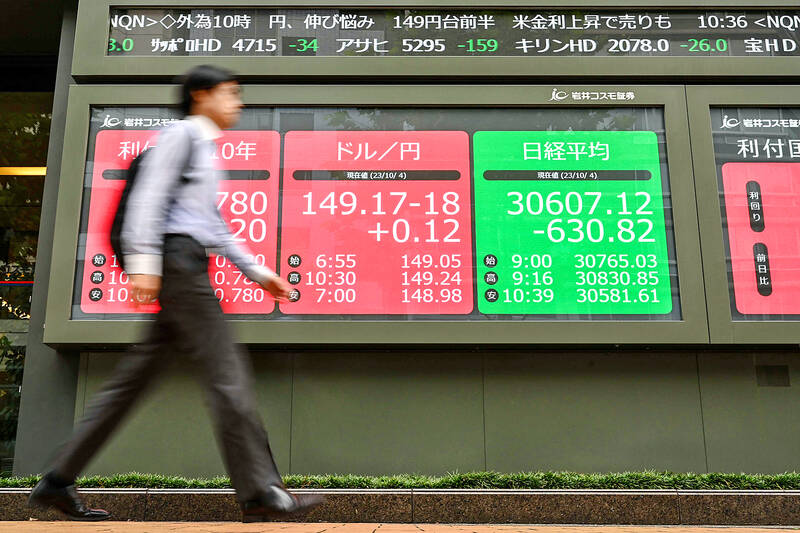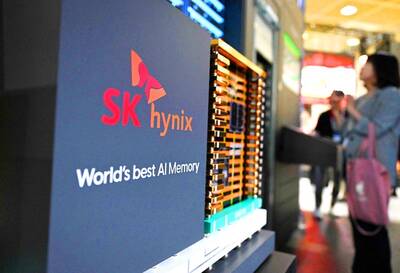A sell-off on global bond markets has gathered pace, driving long-term borrowing costs in the US and Europe to the highest level in more than a decade, quashing appetite for riskier assets and dimming the outlook for growth.
Traders are bracing for an extended period of tight monetary policy, and demanding ever higher compensation to hold long-dated government debt. The repricing — which sent the yield on 30-year US Treasuries past 5 percent for the first time since 2007 — is spilling over into equity and corporate bond markets.
“US yields at highs for the year are starting to look disruptive for other regions and sectors,” HSBC Holdings PLC fixed-income research head Steven Major wrote in a note to clients.

Photo: AFP
The moves come as European Central Bank and US Federal Reserve officials make it increasingly clear that they are unlikely to ease policy any time soon, and are being compounded by concern over swelling government deficits and increased bond supply.
The 30-year US Treasury yield extended its largest quarterly jump in more than a decade. The German 10-year rate climbed to 3 percent — a level unseen since 2011. In Japan, swaps used to bet on 10-year bond yield shifts touched 1 percent for the first time since January.
“One thing that makes me nervous is the speed of the sell-off, which could weigh on market sentiment,” Invesco Ltd fund manager Alexandra Ivanova said.
The jump in US yields, which now tower over peers, has powered a rally in the US dollar in the past few days, sending the euro to its weakest level in almost a year and driving the yen to ¥150 per US dollar on Tuesday.
The volatility has also spilled over to stocks and corporate notes. All three major US indices closed in the red, falling by more than 1 percent on Tuesday, as robust US employment data and rising Treasury yields stoked fears that interest rates would be kept higher for longer.
The Job Openings and Labor Turnover Survey labor report showed a surprise increase in the number of job openings to 9.6 million, a sign of continued tightness in the market, and fueled worries of a further rate hike by the Fed before year’s end.
The rout continued in Europe and Asia yesterday.
Germany’s DAX lost 0.1 percent to 15,071.35. In Paris, the CAC 40 edged 0.1 percent higher, to 7,005.23. In London, the FTSE 100 was down less than 0.1 percent, at 7,466.94.
In Asian trading, Taipei’s TAIEX ended down 1.10 percent at 16,273.38, Tokyo’s Nikkei 225 index sank 2.3 percent to 30,526.88 and the KOSPI in South Korea dropped 2.4 percent to 2,405.69.
Hong Kong’s Hang Seng skidded 0.8 percent to 17,195.84, while markets in China were closed for a week-long holiday.
Australia’s S&P/ASX 200 shed 0.8 percent to 6,890.20. In Bangkok, the SET recovered from early losses, gaining 0.3 percent.
Global bonds are down 3.5 percent this year and yields worldwide are now at levels almost unthinkable at the start of the year.
When bonds are paying so much more in interest, they pull investment dollars away from stocks and other investments prone to bigger price swings than bonds. High yields also make borrowing more expensive for companies and households across the economy, which can hurt corporate profits.
Additional reporting by AP and AFP

Intel Corp chief executive officer Lip-Bu Tan (陳立武) is expected to meet with Taiwanese suppliers next month in conjunction with the opening of the Computex Taipei trade show, supply chain sources said on Monday. The visit, the first for Tan to Taiwan since assuming his new post last month, would be aimed at enhancing Intel’s ties with suppliers in Taiwan as he attempts to help turn around the struggling US chipmaker, the sources said. Tan is to hold a banquet to celebrate Intel’s 40-year presence in Taiwan before Computex opens on May 20 and invite dozens of Taiwanese suppliers to exchange views

Application-specific integrated circuit designer Faraday Technology Corp (智原) yesterday said that although revenue this quarter would decline 30 percent from last quarter, it retained its full-year forecast of revenue growth of 100 percent. The company attributed the quarterly drop to a slowdown in customers’ production of chips using Faraday’s advanced packaging technology. The company is still confident about its revenue growth this year, given its strong “design-win” — or the projects it won to help customers design their chips, Faraday president Steve Wang (王國雍) told an online earnings conference. “The design-win this year is better than we expected. We believe we will win

Power supply and electronic components maker Delta Electronics Inc (台達電) yesterday said it plans to ship its new 1 megawatt charging systems for electric trucks and buses in the first half of next year at the earliest. The new charging piles, which deliver up to 1 megawatt of charging power, are designed for heavy-duty electric vehicles, and support a maximum current of 1,500 amperes and output of 1,250 volts, Delta said in a news release. “If everything goes smoothly, we could begin shipping those new charging systems as early as in the first half of next year,” a company official said. The new

SK Hynix Inc warned of increased volatility in the second half of this year despite resilient demand for artificial intelligence (AI) memory chips from big tech providers, reflecting the uncertainty surrounding US tariffs. The company reported a better-than-projected 158 percent jump in March-quarter operating income, propelled in part by stockpiling ahead of US President Donald Trump’s tariffs. SK Hynix stuck with a forecast for a doubling in demand for the high-bandwidth memory (HBM) essential to Nvidia Corp’s AI accelerators, which in turn drive giant data centers built by the likes of Microsoft Corp and Amazon.com Inc. That SK Hynix is maintaining its